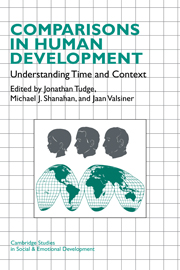Book contents
- Frontmatter
- Contents
- List of Contributors
- Comparisons in Human Development: To Begin a Conversation
- Part One Metatheoretical Approaches to Developmental Comparisons
- Part Two Paradigmatic Statements
- Part Three Comparisons at the Level of Data
- Part Four Commentaries
- 10 Developmental Science: A Case of the Bird Flapping Its Wings or the Wings Flapping the Bird?
- 11 Conceptual Transposition, Parallelism, and Interdisciplinary Communication
- 12 The “Ecological” Approach: When Labels Suggest Similarities beyond Shared Basic Concepts in Psychology
- 13 Problems of Comparison: Methodology, the Art of Storytelling, and Implicit Models
- 14 The Promise of Comparative, Longitudinal Research for Studies of Productive-Reproductive Processes in Children's Lives
- 15 Integrating Psychology into Social Science
- Author Index
- Subject Index
15 - Integrating Psychology into Social Science
Published online by Cambridge University Press: 04 May 2010
- Frontmatter
- Contents
- List of Contributors
- Comparisons in Human Development: To Begin a Conversation
- Part One Metatheoretical Approaches to Developmental Comparisons
- Part Two Paradigmatic Statements
- Part Three Comparisons at the Level of Data
- Part Four Commentaries
- 10 Developmental Science: A Case of the Bird Flapping Its Wings or the Wings Flapping the Bird?
- 11 Conceptual Transposition, Parallelism, and Interdisciplinary Communication
- 12 The “Ecological” Approach: When Labels Suggest Similarities beyond Shared Basic Concepts in Psychology
- 13 Problems of Comparison: Methodology, the Art of Storytelling, and Implicit Models
- 14 The Promise of Comparative, Longitudinal Research for Studies of Productive-Reproductive Processes in Children's Lives
- 15 Integrating Psychology into Social Science
- Author Index
- Subject Index
Summary
The discipline of academic psychology chose long ago to ally itself with the natural sciences and to ground itself in biology. In this regard, the discipline went a separate way from other social sciences such as sociology, which based itself on social and political history. As psychology grew after World War II, it interacted less and less with other social sciences, so that the cumulative effect has been a relative independence in the search for basic laws of human behavior. As long as it was believed that such laws were founded on eons of biological evolution, psychologists needed only to apply proper scientific methods to find and describe them. In recent years, however, this belief has weakened as many psychologists have come to recognize the limits of this view and to acknowledge that society and culture are every bit as fundamental as biology.
This realization has presented psychology with a new problem of trying to find gainful ways to study society and culture. After decades of neglect, psychologists need to develop sophisticated concepts for dealing with them. Two options are either to strive toward workable definitions or to tap into the rich scholarship that the other social sciences provide. The complexity of the task suggests the value of taking the latter path, and were it to be taken, psychologists could build forward from, rather than repeating, the debates that have already gone on within these disciplines.
- Type
- Chapter
- Information
- Comparisons in Human DevelopmentUnderstanding Time and Context, pp. 340 - 354Publisher: Cambridge University PressPrint publication year: 1996
- 1
- Cited by

